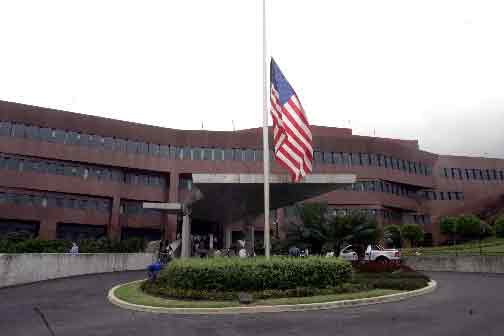El director del diario El Nacional, Miguel Henrique Otero, solicitó financiamiento a la administración estadounidense para evitar una supuesta quiebra de este medio de comunicación opositor al Gobierno del Presidente Hugo Chávez, según se señala en tres documentos redactados por la Embajada de Estados Unidos en Venezuela, filtrados por WikiLeaks.
El diario español El País público ayer tres cables redactados por el embajador de Estados Unidos en Caracas en el 2010, de los muchos documentos filtrados por el Departamento de Estado, en los cuales se aborda el tema de los medios de comunicación en Venezuela.
Eva Golinger, conductora del programa “Táctica y Estrategia”, transmitido por el Canal Informativo de Radio Nacional de Venezuela (RNV), comentó que en uno de los documentos –aún no publicado por WikiLeaks- redactado en febrero de 2010, reseña tres reuniones que sostuvo el embajador estadounidense en Caracas, Patrick Duddy, con varios dueños de medios de comunicación: Alberto Federico Ravell, Guillermo Zuloaga, Nelson Mezherane, y Miguel Henrique Otero.
En la reunión que sostuvieron Otero y Duddy en la oficina diplomática de Estados Unidos en Venezuela, el director de El Nacional consultó sobre la existencia de fuentes de financiamiento privado en el exterior, que le permitieran garantizar la operatividad del rotativo, solicitud que hizo extensiva al Gobierno estadounidense. Otero aseguró al diplomático que “sin esa asistencia El Nacional quebraría en abril de 2010″, debido a una baja registrada en la publicidad, como consecuencia del proceso de nacionalización iniciado por el Gobierno venezolano.
El diplomático, en el cable dirigido al Departamento de Estado norteamericano, colocó una observación: “El embajador le comentó al director de El Nacional que nunca se ha escuchado de casos en los que el Gobierno de Estados Unidos financie a un periódico, incluso durante la terrible época de la dictadura de Pinochet”. Sobre la observación hecha en la nota diplomática, Gollinger refirió que el Gobierno de Washington, a través de la CIA, sí financió al diario El Mercurio de Chile, así como a periodistas que en forma individual colaboraron en contra del gobierno de Allende y de otros gobiernos progresistas de la región.
El documento escrito por Duddy explica que los empresarios mediáticos usaron un lenguaje dramático para respaldar su pedido de fondos. Según ellos, “Globovisión se tuvo que rendir” y “El Nacional está contra las cuerdas” o “dando sus últimos suspiros”. Acusaron al gobierno revolucionario de “presionar” a los medios privados, entre otras acciones, con la incautación de 24 automóviles en una quinta perteneciente a Guillermo Zuloaga, uno de los dueños de Globovisión. Los automóviles habían sido escondidos allí para aumentarse sus precios ilegalmente. Los empresarios mediáticos también acusaron al gobierno venezolano de supuestamente forzarlos a despedir a Alberto Federico Ravell como director de Globovisión, y de supuestas presiones contra Nelson Mezerhane en torno al Banco Federal.
Indicó la investigadora que “el 19 de febrero del 2010, Duddy recibió a los dueños del canal privado Globovisión, Mezherane y Zuloaga, previo a su huida del país”, tras ser acusados de varios crímenes financieros, según refleja uno de los cables filtrados por WikiLeaks. Estos documentos clasificados tienen la categoría de secretos, uno de los niveles más altos de la clasificación, por ser una conversación privada con dueños de medios de comunicación.
A juicio de la analista, estos cables dejan en evidencia la estrecha relación entre los dueños de medios de comunicación, con una fuerte tendencia antichavista, con la administración estadounidense.
Texto original (en inglés) de los documentos desclasificados
| ID: | 250307 |
| Date: | 2010-02-23 18:15:00 |
| Origin: | 10CARACAS219 |
| Source: | Embassy Caracas |
| Classification: | SECRET |
| Dunno: | 09CARACAS663 10CARACAS181 |
| Destination: | VZCZCXRO1197 OO RUEHAG RUEHAO RUEHROV RUEHRS RUEHSL DE RUEHCV #0219/01 0541816 ZNY SSSSS ZZH O 231815Z FEB 10 FM AMEMBASSY CARACAS TO RUEHC/SECSTATE WASHDC IMMEDIATE 0504 INFO EU MEMBER STATES COLLECTIVE IMMEDIATE WESTERN HEMISPHERIC AFFAIRS DIPL POSTS IMMEDIATE RHEHAAA/NATIONAL SECURITY COUNCIL WASHINGTON DC IMMEDIATE RHMFISS/HQ USSOUTHCOM MIAMI FL IMMEDIATE |
| S E C R E T SECTION 01 OF 03 CARACAS 000219
SENSITIVE E.O. 12958: DECL: 2035/02/23 REF: 10 CARACAS 181; 09 CARACAS 663 CLASSIFIED BY: DUDDY, AMBASSADOR, DOS, AMB; REASON: 1.4(B), (D) 1. (S) Summary: In separate meetings with the Ambassador ——————————————— ———————- XXXXXXXXXXXX Resigns; Alleges GBRV Pressure on Globovision Owners ——————————————— ———————- 2. (SBU) Following more than a week of widespread 3. (C) In a private meeting on February 17, XXXXXXXXXXXX told the 4. (C) XXXXXXXXXXXX affirmed to the Ambassador that Nelson CARACAS 00000219 002 OF 003 ——————————————— ———- XXXXXXXXXXXXConfirm Capitulation ——————————————— ———- 5. (S) In a February 18 meeting with the Ambassador, XXXXXXXXXXXX 6. (S) Despite XXXXXXXXXXXX’s pronouncements at his press 7. (S) XXXXXXXXXXXX told the Ambassador that the station is ——————————————— —- Major Newspaper Taking Its Last Gasps? ——————————————— —- 8. (S) In a separate February 19 meeting, Ambassador Duddy CARACAS 00000219 003 OF 003 be out of money and thus business by April. XXXXXXXXXXXX affirmed that 9. (S) XXXXXXXXXXXX noted that increased GBRV nationalizations would 10. (C) Comment: Chavez continues to reduce the private media’s |
|



